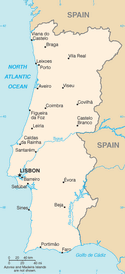Portugal
 Portugal is country of Europe located in south Europe.
Portugal is country of Europe located in south Europe.
Details
| Official Name: | Portuguese Republic |
| Capital: | Lisbon |
| Total area: | 92 212 km2 |
| GDP per capita: | $23,385 |
| Native Language: | Portuguese |
| Government: | Unitary semi-presidential constitutional republic |
| Population: | 10,487,289 |
| Major Religion: | Roman Catholicism |
| Monetary Unit: | Euro (EUR) |
Portugal, a country with a rich history of seafaring and discovery, looks out from the Iberian Peninsula onto the Atlantic Ocean. Portugal's history has had a lasting impact on the culture of the country: Moorish and Oriental influences in architecture and the arts are prominent.
Over the past 3 000 years, Portugal has witnessed a constant ebb and flow of civilisations. Phoenician, Greek, Celt, Carthaginian, Roman and Arabic cultures have all left their imprint. In the 15th century, Portugal’s intrepid maritime explorers led by Vasco da Gama discovered new territories, leading to the accumulation of an overseas empire. At home, the university of Coimbra, established in 1290, is one of the oldest in Europe.
The President, elected for a five-year term by universal suffrage, has limited powers. The parliament has 230 members, whose mandate is for four years.
Portugal has always been well represented in the arts. Famous poets include Luís de Camões and Fernando Pessoa. No less creative are the talents of international footballer Cristiano Ronaldo.
During the month of June, festivities dedicated to three saints known as Santos Populares (popular saints) take place all over Portugal. They are characterised by folk dance and music, particularly the traditional melancholy fado.
Each region of Portugal has its traditional dishes made with various kinds of meat and seafood. In particular, the country is particularly well known for its one hundred ways of cooking cod.
Health & Welfare
Comprehensive social insurance including maternity leave, unemployment benefits, old age pensions, disability and survivor benefits, 100% paid medical and pharmaceutical expenses.
Economy & Jobs
Agriculture, forestry, fishing, mining, manufacturing, construction, and tourism.
Main Attractions
Lisbon, Lagos beaches and Sintra town.
Economy
The Portuguese currency is the euro (€) and the country was one of the original member states of the eurozone. Portugal's central bank is the Banco de Portugal, an integral part of the European System of Central Banks. Most industries, businesses and financial institutions are concentrated in the Lisbon and Porto metropolitan areas—the Aveiro, Braga, Coimbra and Leiria districts are the biggest economic centres outside these two main areas.
Since the Carnation Revolution of 1974, which culminated in the end of one of Portugal's most notable phases of economic expansion (that started in the 1960s), a significant change has occurred in the nation's annual economic growth. After the turmoil of the 1974 revolution and the PREC period, Portugal tried to adapt to a changing modern global economy, a process that continues in 2013. Since the 1990s, Portugal's public consumption-based economic development model has been slowly changing to a system that is focused on exports, private investment and the development of the high-tech sector. Consequently, business services have overtaken more traditional industries such as textiles, clothing, footwear and cork (Portugal is the world's leading cork producer), wood products and beverages.
Immigration and residency
If you are interested in moving to the countries, either with a residence permit or by acquiring a citizenship, please contact us, and also get acquainted with the relevant migration documents.